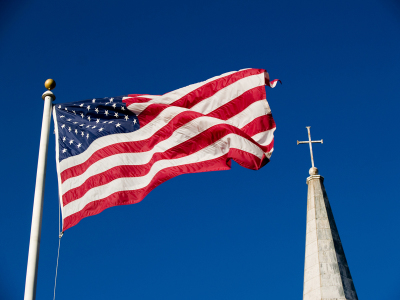
Lately, I’ve noticed another disturbing trend gaining steam online — self-described Christian nationalists openly advocating for “forced conversions” and mandatory church attendance. It’s not just a fringe opinion anymore. It’s creeping deeper into circles that should know better.
At first, it seems so absurd you almost want to laugh. After all, no one — no matter how powerful — can force someone to actually believe anything. You can coerce outward compliance, sure. You can make a man recite “2 + 2 = 5” with a gun to his head, but you can’t make him actually believe it’s true in his heart. The human heart is not so easily conquered — and even if it were, Christians above all people should know that true faith — and by extension, obedience — isn’t manufactured by threats and punishments. It’s born from a supernatural work of God.
Even God Himself, who could easily overwhelm us, chooses not to force belief. Jesus doesn’t kick down the door to your heart. He knocks.
“Behold, I stand at the door and knock. If anyone hears my voice and opens the door, I will come in to him and eat with him, and he with me” (Revelation 3:20).
But that’s not really what these Christian Nationalists seem interested in, is it? They’re not primarily concerned with the heart — the inner man, Christianity itself, the seat of true worship. They want outward religious conformity to their particular fundamentalist system. “Cultural Christianity,” as they call it. They want a visible facade of a Christian society, whether the hearts beneath it love Christ or not — they appear to skip over the first part of the Great Commission (Matt. 28 — to believe, to love the Lord), and jump right to the second (to obey). But what they fail to understand is that cultural Christianity — and true obedience — is only made possible by a nation of individual souls captured by the love of God, not one going through the motions of external uniformity to some state-approved religious “orthodoxy.”
And in doing so, they not only misunderstand the Gospel — they attack the Church itself.
The rise of coerced ‘cultural Christianity’
Consider a recent example: a loudmouth cult-following nationalist on X, Jack Harper, proudly proclaimed that forced cultural Christianity is not only desirable, but that, under his rule, church attendance could be made mandatory — and execution of heretics would even be “permissible.”
This isn’t Christianity. It’s a bizarre religious fundamentalism barely distinguishable from the authoritarian theocracies Christianity historically opposed. It’s Islamic Sharia with a cross slapped on top.
And Harper isn’t alone. Another Christian nationalist (whose posts are now blocked from viewing) chimed in to say:
“Yes, I do believe in forced church attendance. Obviously, that’s not going to happen tomorrow, but making people attend church where they will hear the gospel preached every week is possibly the best thing a government can do for a citizen.”
Because, of course, nothing stirs up genuine repentance quite like being frog-marched into a pew at gunpoint. The thinking seems to be: if the government forces you to listen to enough sermons, maybe you’ll catch salvation like a head cold.
But that’s not how the Spirit works. That’s not how the Church works. And that’s certainly not how the gospel works.
The Church: God’s people, not a public venue
This is where the real confusion lies.
The Church is not a building. It’s not a public service center or utility. It’s not a government-run rehabilitation program to fix misbehaved citizens.
The Church is the gathering of God’s people — the born-again, those regenerated by the Holy Spirit, coming together to worship God in spirit and truth.
When you drag unregenerate pagans into that gathering by force, you are not expanding the Kingdom. You’re polluting it. You’re corrupting worship.
Imagine thinking the solution to “too much paganism in the church” — as many Christian Nationalists rail about on repeat — is … forcing more pagans into the church.
It’s theological and ecclesiological insanity.
The Church welcomes outsiders to hear the gospel, yes. It proclaims Christ boldly. But the gathering itself — the worship, the fellowship, the sacraments — these things are for believers. Evangelism happens outside the assembly walls, not by flooding the sanctuary with hostile unbelievers who don’t know Christ and have no desire to worship Him.
Forcing non-believers into church doesn’t create worshipers. It creates rebels. You aren’t building the Body; you’re building a mob against the Body.
The Church is a holy assembly. It’s God’s people, worshiping their King, not a catch-all civic meeting for the spiritually indifferent.
The Calvinist connection
Now, let me step on some toes.
It’s worth noticing that many who push forced outward Christianity are hardline Calvinists — men who already believe God regenerates the human heart without human cooperation. In their system, salvation isn’t freely embraced but sovereignly imposed.
So, it’s not surprising that some would extend this logic to society at large: if God can impose salvation irresistibly, why shouldn’t the government impose worship externally?
But here’s the problem: we are not God. We can’t raise dead hearts. We can’t regenerate souls with legislation. What God does by His Spirit, we cannot replicate by the sword.
Trying to do by law what only grace can accomplish doesn’t build Christ’s Kingdom. It builds a cold, lifeless counterfeit — a joyless regime of outward compliance without inward transformation. What will we actually think this will lead to?
As C.S. Lewis famously said:
“God cannot ravish. He can only woo” (Mere Christianity).
And His Church must follow His example.
‘What about Christian laws?’
Now, some will object: “Aren’t you against laws outlawing, let’s say, murder, too? Isn’t that forcing Christian morality on unbelievers pre-conversion?”
Not even close.
Civil laws against murder, theft, and injustice aren’t about enforcing religious worship; they’re about upholding basic human dignity and social order — things even nonbelievers recognize through conscience and Natural Law (Romans 2).
Civil government is tasked with restraining evil actions (Romans 13) — not manufacturing faith. Laws rightly protect bodies. They cannot regenerate hearts.
Forcing worship — something that is frankly impossible to do, as forced worship is no worship at all — isn’t “protecting society”; it’s desecrating worship. And it’s not the state’s job. It’s the church’s job to preach, persuade, and suffer if necessary — and God’s job to change hearts.
The New Testament pattern: No coercion, only conversion
When we actually look at Scripture, the difference is blindingly obvious.
The apostles never demanded that Caesar enforce Christianity. Paul wasn’t lobbying Roman senators to institute mandatory synagogue quotas. Peter wasn’t petitioning Herod to build state-run megachurches. And none of the disciples, or Jesus himself, commissioned the Church to take up arms in order to build “Christendom.”
Instead, they preached. They persuaded. They suffered. And they didn’t punish those who refused to repent.
And the Church exploded — without political power, without legislation, without coercion.
At Pentecost, the Spirit fell, not because the government forced people into the Upper Room, but because the Word was preached, and hearts were voluntarily pierced.
When the apostles were beaten and commanded to shut up, their answer wasn’t, “Let’s seize political control and make them Christian by law!” It was, simply:
“We must obey God rather than men” (Acts 5:29).
They didn’t rely on the sword. They relied on the Spirit.
They knew, as Jesus said:
“My kingdom is not of this world. If my kingdom were of this world, my servants would have been fighting” (John 18:36).
The real Christian revolution came from faithful witness, patient suffering, and supernatural heart-change — not from taking over earthly thrones.
Unless, of course, we all missed the chapter in Acts where the early church sought to impose rigid external religious conformity via the government. Then, consider me wrong here in my analysis.
The real threat to the Church
The irony is brutal: the forced-religion model these nationalists are proposing doesn’t look like early Christianity at all. It looks like Islamic Sharia. It looks like Roman Catholic inquisitions. It looks like every false religion that mistook outward conformity for true worship.
It is not faith. It is based out of fear — a primary motive within “Christian” Nationalism — they fear the government so much, unwilling to take up their cross and suffer with Christ, that they spend every waking moment plotting how to commandeer the civil magistrate for themselves, while kicking out the ladder beneath them, along with the God-given rights of each citizen. They are building their own kingdom, not the Lord’s, and they will have their reward.
It does not grow the Church. It hollows it out.
And the saddest part? Church history proves over and over: whenever the state “forces” Christianity, the true Gospel dies in the streets while hypocrisy floods the pews.
The early church conquered the world not by mandates, but by martyrdom (Acts 7).
Tertullian didn’t say, “The sword of the magistrate is the seed of the church.” He said, “The blood of the martyrs is the seed of the church.”
Constantine didn’t invent Christianity by decree. He simply bowed to a movement, perhaps for his own political benefit, that was already unstoppable — because the Spirit, not the state, had already won. Politics follows culture, and culture follows the hearts of men.
If we really want Christian renewal in America — a Christian nation, we don’t need a president mandating Bible study or police dragging pagans into churches — We need born-again Christians (John 3).
We need to do what the Church has always done: preach the gospel, love our neighbor, suffer when necessary, and trust that Christ — not Congress — builds His Church.
Christianity does not spread by coercion.
It spreads by blood, by tears, by Word, and by Spirit.
And any Christianity that spreads by force isn’t Christianity at all.
Mikale Olson is a contributor at The Federalist and a writer at Not the Bee, specializing in commentary on Christian theology and conservative politics. As a podcaster, YouTuber, and seasoned commentator, Mikale engages audiences with insightful analysis on faith, culture, and the public square.

















